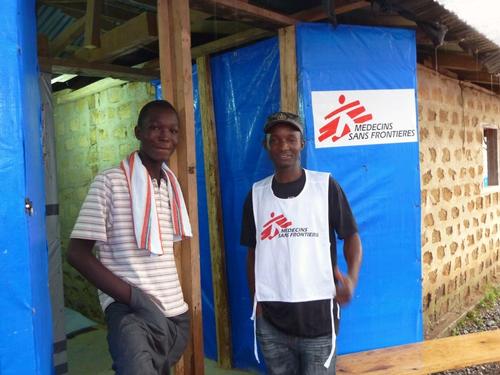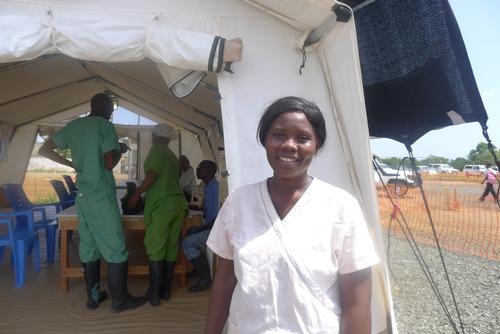Forced quarantine of asymptomatic health workers returning from fighting the Ebola outbreak in west Africa is not grounded in scientific evidence and could undermine efforts to curb the epidemic at its source, Médecins Sans Frontières (MSF) said today.
Diligent health monitoring of returnees from Ebola affected countries is preferable to coercive isolation of asymptomatic individuals.
“There are other ways to adequately address both public anxiety and health imperatives, and the response to Ebola must not be guided primarily by panic in countries not overly affected by the epidemic,” said Sophie Delaunay, executive director of MSF-USA. “Any regulation not based on scientific medical grounds, which would isolate healthy aid workers, will very likely serve as a disincentive to others to combat the epidemic at its source, in West Africa.”
International MSF staff members commit to burdensome four-to-six week assignments in the Ebola affected countries. The risk of being quarantined for 21 days upon completion of their work has already prompted some people to reduce their length of time in the field. Others will be less inclined to volunteer in the first place. This will present significant operational disruptions at the field level for MSF and other organizations, and lead to an overall shortage of desperately needed health workers, precisely when the Ebola outbreak is as out of control as ever.
As it is, MSF draws on a small pool of people with highly specific skill sets required in an Ebola setting. Further restricting access to that group of aid workers could have devastating consequences. Since March, MSF has sent more than 700 international staff to West Africa as part of its Ebola response.
Enhanced restrictions on returned aid workers in the United States could lead to similar measures adopted in other countries, leading to an even greater impact on the ability to fight the outbreak in west Africa.
"We need to be guided by science and not political agendas," said Dr. Joanne Liu, international president of MSF. "The best way to reduce the risk of Ebola spreading outside West Africa is to fight it there. Policies that undermine this course of action, or deter skilled personnel from offering their help, are short sighted. We need to look beyond our own borders to stem this epidemic."
Medical science has demonstrated that asymptomatic people with Ebola infection do not transmit the virus. Ebola is also not an airborne virus, like cold or flu viruses. It is only transmitted through direct contact with an infected, symptomatic person’s body fluids, such as blood, vomit and feces.
MSF protocols governing returned health workers are based upon the guidelines of international health agencies, notably the World Health Organization and the US Centers for Disease Control (CDC), and they have been followed rigorously.
Furthermore, the risk of stigmatization of health workers is very real. It is imperative that the public maintains trust and confidence in all health workers. Medical professionals specializing in infectious diseases, such as tuberculosis and HIV/AIDS, do not face stigma and burdensome restrictions on their movements.
MSF’s West Africa Ebola response began in March 2014 and consists of activities in three countries: Guinea, Liberia and Sierra Leone. MSF currently employs 270 international staff members and more than 3,000 locally hired staff. MSF operates six Ebola case management centers (two each in Guinea, Liberia and Sierra Leone), which provide approximately 600 beds in isolation units. Since the beginning of the outbreak, MSF has admitted more than 4,900 patients, of whom roughly 3,200 were confirmed as having Ebola. About 1,140 have survived. More than 877 tons of supplies have been shipped to the affected countries since March.
MSF as an organization treated more than nine million people in nearly 70 countries last year alone. More than 180,000 women were assisted with childbirth, and more than 77,000 surgical procedures were performed. Nearly two million cases of malaria were treated. MSF aid workers commit significant time, energy, and skills before, during, and after field assignments. The organization’s protocols are designed with that in mind, because delivering lifesaving emergency medical care to the people who need it most depends on doing everything to keep aid workers healthy.





